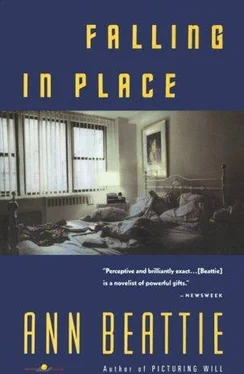Ann Beattie - Falling in Place
Здесь есть возможность читать онлайн «Ann Beattie - Falling in Place» весь текст электронной книги совершенно бесплатно (целиком полную версию без сокращений). В некоторых случаях можно слушать аудио, скачать через торрент в формате fb2 и присутствует краткое содержание. Год выпуска: 1991, Издательство: Vintage, Жанр: Современная проза, на английском языке. Описание произведения, (предисловие) а так же отзывы посетителей доступны на портале библиотеки ЛибКат.
- Название:Falling in Place
- Автор:
- Издательство:Vintage
- Жанр:
- Год:1991
- ISBN:нет данных
- Рейтинг книги:4 / 5. Голосов: 1
-
Избранное:Добавить в избранное
- Отзывы:
-
Ваша оценка:
- 80
- 1
- 2
- 3
- 4
- 5
Falling in Place: краткое содержание, описание и аннотация
Предлагаем к чтению аннотацию, описание, краткое содержание или предисловие (зависит от того, что написал сам автор книги «Falling in Place»). Если вы не нашли необходимую информацию о книге — напишите в комментариях, мы постараемся отыскать её.
Falling in Place — читать онлайн бесплатно полную книгу (весь текст) целиком
Ниже представлен текст книги, разбитый по страницам. Система сохранения места последней прочитанной страницы, позволяет с удобством читать онлайн бесплатно книгу «Falling in Place», без необходимости каждый раз заново искать на чём Вы остановились. Поставьте закладку, и сможете в любой момент перейти на страницу, на которой закончили чтение.
Интервал:
Закладка:
The phone rang again. She let it ring six times before picking it up. It was the operator, asking if she would pay the overtime charges on Bobby’s call.
She went into the kitchen, and looked at the picture she had taken of him in Provincetown: his look of surprise, thinking himself alone. She had felt bad about interrupting him, spoiling even a moment of his fun as he flew the kite, absorbed in what he was doing. She had captured the moment in time, and yet she hadn’t, because she wasn’t in the picture. He liked the picture, but wished that it had never been taken. He wanted both things: He wanted to be private, and he wanted to be accessible. The kite, high up, had looked like some prehistoric bird, and when he began to bring it down, when the air currents changed, it had swooped and dipped, crashing on its nose. It had tried to destroy itself. It had not. She was anthropomorphizing the kite. She had a tendency to see inanimate things as living, and he had a tendency to see living things as inanimate. He thought the tickling would not really hurt, that she could stand to be exhausted, that he could go on and on with it.
She wiped her eyes on a handkerchief Bobby had left behind. If all the men she met were crazy, then she must be looking for crazy men, right? Wrong. They came to her . She had never even heard of Bobby until his phone call, and then he had showed up, gone away, then called and said that he wanted her to live with him. What she wanted — and this time she was going to get her way — was to have somebody to go to dinner with, because she had had a bad day and needed company, and she needed protection from the crazy magician who would probably be hanging around outside.
She talked to Spangle’s picture. She asked him how he could have done it. She accused him of being a coward. He looked astonished.
She pulled her hair back in a rubber band and took off her clothes and got into the shower. She put her face under the water, and felt the difference between the wetness of water and the wetness of her tears, as the shower spray washed them away. Her cheeks felt puffy, and her eyes felt hot. She had just lost, and someone she hardly knew had had to tell her that. She had suspected, but she hadn’t known. She smiled, remembering a game of cards she had played with Spangle years before in a motel room, the two of them on a trip to see his grandmother in Idaho. She had won the first game, and then in the middle of the second, she had had to ask, “What are the rules again?” A blind person crossing the street, then climbing onto the sidewalk and forgetting what a sidewalk was. One night she had helped a blind woman across Chapel Street, and when they were safely on the sidewalk, the woman had stood there, looking more baffled than she had standing on the curb at the opposite side, hesitating about crossing. Cynthia had gone back to her. “You know where you are now?” she had said, and the woman, sounding baffled, had reeled off the names of streets to the left and streets to the right. She knew where she was. Cynthia looked back at her once, and she was still standing there. Why should it be odd that a blind person was baffled? Because you assume that when they can find their way, they are all right. What if they can find their way but don’t want to, or are just tired of it? She turned her face into the stream of water from the showerhead again. She had the feeling that the blind woman might still be standing where she had left her. And the feeling, at the same time, that she might be misjudging Spangle. It just didn’t make sense. At least he would want his clothes. All his sweaters were full of holes — maybe he meant to take the holes and leave the sweaters. He did not like donuts, and sometimes when he went with her to the all-night donut shop he would have just a glass of milk, telling the waitress to bring him three donut holes. That joke went bad the night the store started baking what they called “donut holes”—round pieces of dough cut from the inside of the donut.
She tried to hate him, to convince herself that what was behind all his kidding was a lack of respect for other people. Some days he could hardly do anything without turning it into a joke. He would joke at the dry cleaner’s (handing over his sports jacket, saying, “No starch”), he would pull pranks on tired waitresses, demand a free glass at a gas station that wasn’t giving anything away. He told Johnny Carson better jokes, talking to the television, than Johnny was telling late-night America. She put a big towel around herself and stood there, in the tub, thinking. These were not good things to hate him for. At the very least, they showed that he was alive, that he didn’t just go through life like a zombie, intimidated at the dry cleaner’s, oblivious to waitresses. He didn’t mind letting people in gas stations know, subtly, that he realized they were getting the best of him, that the days of free glasses were over.
He talked a lot, and she was a quiet person. That had always been a problem. She liked to be quiet, and he got edgy when there wasn’t noise. Standing in the kitchen, he would idly tap with a fork on the top of the stove as he waited for something to come to a boil; he would shave in the morning with the bathroom door open, so he could talk to her. She had actually managed, after a long time, to understand what he was saying while he was shaving: He spoke in fragments and words that didn’t come out right, because of the way he was twisting his face. And he had gotten a pair of earphones so that if he woke up at night and couldn’t sleep, he could listen to music without disturbing her.
She was getting sentimental. She was not succeeding in hating him. She stepped out of the tub, dried off, and took her clothes from the hook on the back of the door. She went into the bedroom, where it would be less damp, to dress. When she dressed, she looked at herself in the mirror. It was a mirror that had once been on a carousel, with a scalloped top and curved bottom and a heavy gilded border with raised cherubs and flowers, from which the gilt paint was falling away. He had bought it for a hundred dollars and brought it back to the apartment and put it on the bedroom wall. The silver had started to deteriorate, too, so that great areas of the glass were scratchy and cloudy, nothing to be seen in them. You could still see very well in the right-hand side of the mirror, though. She stood in front of it and looked at herself: prettier than average, but hardly the type a man would ask to come live with him after one meeting. Was it her mind? She always ended up with men who talked faster than she did, even if they didn’t think faster. What, then? She had asked Spangle, and he had admitted that it was something he had a hard time explaining. It was that she had self-confidence, he said. She pointed out that she was shy about meeting people. It was that she was smart. A lot of people were smart. It was that he had hung the huge carousel mirror in the bedroom and he had done it knowing it was right, that she would like it, that he wouldn’t have to consult her about it. It made her nervous, she said. It was just too big — the way it mirrored the room made the room look like something in a fun house. He admitted then that he couldn’t put his finger on it, but he tried again anyway: not exactly self-confidence, but the impression she gave of being at peace — no nightmares about fireballs. Maybe she was too oblivious, she said. It was hardly flattering to be praised for something she did or didn’t do in her sleep.
When he was a child, he told her, he had been a sleepwalker. They used to find him curled up by the kitchen stove, like a cat. Now all he did was thrash in his sleep, dream occasionally. She wondered what would happen if she didn’t awaken him — if the fireball would get him, if then there would be silence. She never had the heart. She jumped on him like a crazed mugger, a mugger wanting to bring him down and quiet him. He had scared her to death the first time he had done it. He had thrashed as though he were having a seizure, hand thrown over his face, his back arching up off the bed. “I have nightmares,” he had explained. Sometimes he was funnier when he stated facts than when he concocted elaborate stories. He would tell her that he really liked hamburgers, as he was eating a fourth hamburger. She liked it that he said the obvious and didn’t realize that he was doing it, or that there was anything funny about doing it. She supposed that she could tie that in with his underestimating people’s intelligence, but that wouldn’t really be true — he did it more out of innocence than anything else. He often said things after the fact. So maybe he was going to call, still. If he called, she wondered if he would concoct a story, or simply tell her that he was back. He had no way of knowing that she would meet Bobby, who would go to visit Victor, who would run into… His world — his world full of his crazy friends — no wonder he thought that she was calm and self-assured. She had never run into such a collection of people. They expressed doubt so easily. They didn’t hesitate to reveal personal things, self-doubts, failings, any longer than a person with hot toast will wait before buttering it.
Читать дальшеИнтервал:
Закладка:
Похожие книги на «Falling in Place»
Представляем Вашему вниманию похожие книги на «Falling in Place» списком для выбора. Мы отобрали схожую по названию и смыслу литературу в надежде предоставить читателям больше вариантов отыскать новые, интересные, ещё непрочитанные произведения.
Обсуждение, отзывы о книге «Falling in Place» и просто собственные мнения читателей. Оставьте ваши комментарии, напишите, что Вы думаете о произведении, его смысле или главных героях. Укажите что конкретно понравилось, а что нет, и почему Вы так считаете.












